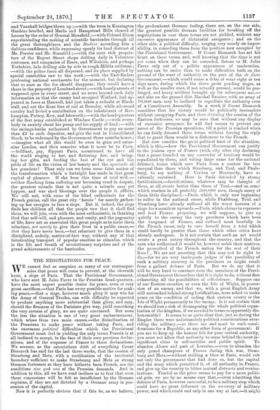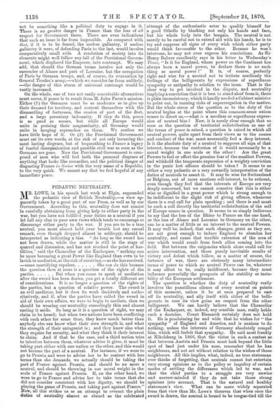THE NEGOTIATIONS FOR PEACE.
WE cannot feel as sanguine as many of our contempor- aries that peace will come to prevent, at the eleventh lour, a siege of Paris. That the Provisional Government, who have sent M. Jules Favre to the Prussian head-quarters, have the most urgent possible desire for peace, even at very great sacrifices,—that Paris has every possible motive for mak- ing peace,—that a siege, however much glory it may win for the Army of General Trochu, can with difficulty be expected to produce anything more substantial than glory, and may, should the firmness of the Parisians give way, yield something the very reverse of glory, we are quite convinced. But none the less the situation is one of very great embarrassment, which arises from two main causes,—the disinclination of the Prussians to make peace without taking Paris, and the enormous political difficulties which the Provisional 'Government must feel in yielding the only terms Prussia is at all inclined to accept, in the face of their own previous declar- ations, and of the response of France to those declarations. We assume, as the ostentatious drift of everything Count Bismarck has said for the last three weeks, that the cession of Strasburg and Metz, with a rectification of the territorial 'boundary sufficient to make Strasbourg and Metz as strong 'German fortresses as they have hitherto been French, are the conditions sine gad non of the Prussian demands. And in addition to this, all we have read inclines us to fear that even these concessions will be felt as insufficient by the German captains, if they are not dictated by a German army in pos- session of the capital.
Now it is perfectly obvious that if this be, as we believe, the predominant German feeling, there are, on the one side, the greatest possible German facilities for breaking off the negotiations in case these terms are not yielded, without any excessive appearance of dictatorial arrogance ; and on the other side, a political difficulty, verging very nearly on impos- sibility, in conceding them from the position now occupied by the Provisional Government. If Count Bismarck has set his heart on these terms, and, well knowing that the time is not yet come when they can be conceded, listens to M. Jules Favre only out of a politic appearance of moderation, nothing can be easier than to make difficulties both on the ground of the want of authority on the part of the de facto Government,—which would cause a delay of some eight or ten days more, during which the three great pending sieges, as well as the smaller ones, if not actually pressed, would be pro- longed, and heavy artillery brought up for subsequent use,— and also on the ground that Marshal Bazaine, with an army of 70,000 men, may be inclined to repudiate the authority even of a Constituent Assembly. In a word, if Count Bismarck considers that his victory would be politically incomplete without occupying Paris, and there dictating the cession of the Eastern fortresses, we may be sure that without any display of excessive arrogance he will find means to prevent any arrest of the Prussian operations, till a point is reached when he can fairly demand these terms without forcing the reply that to grant them would be a dishonour to the French.
But now consider the great political knot of the situation, which is this,—how the Provisional Government can justify to the jealous eyes of France (with city after city declaring that a peace founded on any surrender of territory would be repudiated by them, and voting large sums for the national defence), terms which save Paris from a contest far less unequal than those which Strasburg, and Toul, and Phals- burg, to say nothing of Verdun or Montm6dy, have so valiantly sustained. Here is Paris defended by strong fortifications,—fortifications, whatever may be thought of them, at all events better than those of Toul,—and an army which reaches in all probably 300,000 men, though many of them little disciplined,—Paris, which is only now beginning to suffer in the national cause, while Phalsburg, Toul, and Strasburg have already suffered all the worst horrors of a siege for a month or upwards,—Paris, which claims to represent and lead France, proposing, we will suppose, to give up quietly to the enemy the very provinces which have been the vanguard of France, and suffered most fearfully in the French cause, only to save herself from a trial which could hardly be greater than those which other cities have already undergone. Is it not certain that such an act would create a great outcry throughout the country, and that the men who authorized it would be, however noble their motives, the proscribed of the French nation for the rest of their lives? We are not asserting that this may not be right to do,—for we are very inadequate judges of the possibility of such a military recovery in the provinces as might result from a gallant defence of Paris. But we do say that it will be very hard to convince even the members of the Provi- sional Government themselves that it is right to do, without first exhausting all the possibilities of self-defence. Suppose one of our Eastern counties, or even the Isle of Wight, in posses- sion of an enemy, and that we, with a great English Army still untouched behind strong fortifications, were asked to make peace on the condition of ceding that eastern county or the Isle of Wight permanently to the enemy. Is it not certain that we should run a risk of decomposing the whole political organ- ization of the kingdom, if we acceded to terms so apparently dis- honourable? It seems to us quite clear that, just as during the Empire there were unfortunately political considerations over- riding the military,—so there are and must be such consi- derations for a Republic, or any other form of government. If you are to keep up the honour felt for your central authority, you must not allow that authority to seem behind the most in- significant cities in self-sacrifice and public spirit. To abandon Alsace and part of Lorraine,—even to abandon the only grand champions of France during this war, Stras- burg and Metz,—without striking a blow at Paris, would rob not only the government that had done so, but the capital and the army which permitted it, of all authority in France, and give up the country to bitter mutual distrusts and recrim- inations. Fearful as the price seems to pay for a mere politi- cal gain, we are by no means sure that,—even admitting the defence of Paris, however successful, to be a military step which could have no great influence on the recovery of military power, and which could end only in one way at last,—it might
not be something like a political duty to engage in it. There is no greater danger in France than the loss of all respect for Government there. There are even indications that such an issue is far from impossible. As compared with that, if it is to be feared, the useless gallantry, if useless gallantry it were, of defending Paris to the last, would involve comparatively small evils. A resolution of society into its elements might well follow any fall of the Provisional Govern- ment, which displaced the Emperor, into contempt. We may add, that should the German terms involve not only the surrender of Alsace and part of Lorraine, but the occupation of Paris by German troops, and, of course, its evacuation by General Trochu's army,—which we consider far from unlikely, —the danger of this storm of universal contempt would be vastly increased.
On the whole, one of two not easily conceivable alternatives must occur, if peace is to result from M. Jules Favre's mission. Either (1) the Germans must be so moderate as to give up their demand for territory, and content themselves with the dismantling of fortresses, the cession of part of the fleet, and a large pecuniary indemnity. If they do this, peace is as good as secure, but while all Europe would unite in praising their magnanimity, all Germany would unite in heaping reproaches on them. We confess we have little hope of it. Or (2) the Provisional Government must eat its own words, at the risk of not only incurring the most lasting disgrace, but of bequeathing to France a legacy of fearful disorganization and possible civil war as soon as the Germans are gone. Now the Provisional Government is com- posed of men who will feel both the personal disgrace of anything that looks like cowardice, and the political danger of disgusting France in Undue with the very name of a Republic, to the very quick. We cannot say that we feel hopeful of any immediate peace.































 Previous page
Previous page